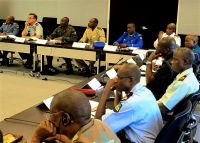WASHINGTON, May 21, 2011 — Senior leaders representing 17 African national militaries came together with their American counterparts here this week to better understand U.S. Africa Command and to help in developing the noncommissioned officers corps in their nations.
Speaking through interpreters and wearing the uniforms of their home countries — Liberia, Rawanda, Botswana, Kenya, Gabon, and Senegal, to name a few — the officers shared their militaries’ distinct experiences and offered support and advice for others, said U.S. Air Force Command Chief Master Sgt. Jack Johnson, Africom’s senior enlisted leader, who led the group.
“I was absolutely taken back by their level of wisdom,” Johnson told American Forces Press Service yesterday. “These are not young soldiers. These are people who have seen conflict. They’ve seen a lot.”
The second annual, week-long Warrant Officer and Sergeants Major Symposium, co-hosted by Africom and the African Center for Strategic Studies at National Defense University, employs subject-matter experts with experience in Africa to lead discussions on topics such as terrorism and transnational threats, security and health challenges, civil-military partnerships, and U.S. policy in Africa. The symposium also included tours of the Pentagon, U.S. Marine Base Quantico, Va., and the U.S. Capitol.
While it may have been tempting for U.S. military leaders to offer solutions through American experiences, Johnson said, that is exactly what the American sponsors avoided.
“We want the Africans to find African solutions,” he explained. “There are many things the Africans do as well as us. We don’t feel that we are superior. We believe that we can all learn from each other.”
The symposium also provided the participants a forum for discussing regional issues such as malaria, and politically sensitive topics such as allowing women to serve in the military and managing HIV and AIDS among service members, Johnson said.
“There was tremendous bonding in the amount of time that we spent together,” he said, adding that the participants showed much courage in the frankness of their discussions.
Sgt. Maj. Gilbert Seretse of the Botswana Defense Forces said he was not unusual among the group in that he had trained abroad – for him, at the U.S. Army Sergeants Major Academy at Fort Bliss, Texas – but had never met anyone from some of Botswana’s neighboring countries.
“Most of us didn’t even know what our African peers were doing,” Seretse said, noting vast regional differences on the continent.
“I never thought that one day I would be sitting around a table with my brothers from Africa,” he said. “This has opened our minds and our eyes and our ears to each other.”
Seretse said he left the symposium with a better understanding of Africom and he looks forward to sharing what he learned with his troops.
“Botswana is a major beneficiary in terms of what the United States gives,” he said. “Every week, I have some [U.S.] military guys training” Botswana’s forces.
The symposium is important not just for the benefit of the individual participants and their militaries, Johnson noted, but also to the United States. “The world is connected,” he said. “The success of our African partners leads to the success of our own national security interests, and vice versa.”
Source:
U.S. Department of Defense
Office of the Assistant Secretary of Defense (Public Affairs)

 von
von 